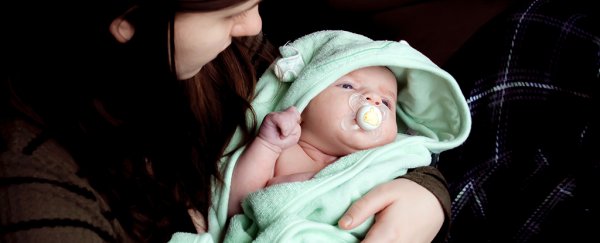When babies are delivered by Caesarian section, some mothers will opt for a common medical procedure called "vaginal seeding", in which the newborns are swabbed with fluid from the mother's, well, you get it.
Now, a new study has found that the whole thing is based on some pretty shaky science and is probably unsafe for the newborn.
When a baby is born vaginally, they come into contact with a whole bunch of germs from the mother's vaginal canal, skin, and intestines. These germs are the foundation of a newborn's microbiome, which shapes our immune system and protects us from pathogens.
Vaginal seeding is based on the idea that a healthy microbiome and, in turn, a strong immune system depends on the "bacterial baptism" of a vaginal birth.
The idea is supported by prior studies that suggest babies delivered by C-section have different microbiomes and, as a result, appear to be at a greater risk of developing problems like asthma, allergies, autoimmune disorders, and obesity later in life.
Yet despite the fact that vaginal seeding has been gaining in popularity, there is no convincing evidence that it is either effective or safe.
A comprehensive review of research on this topic has revealed that while C-sections do indeed alter infant microbiomes, the health of these microbiomes is not simply dependent on how a child is delivered.
"After reviewing the scientific evidence, we find no support for the 'bacterial baptism' hypothesis," said lead author Lisa Stinson, a PhD student studying prenatal microbiomes at the University of Western Australia.
"While we know that caesarean delivery impacts the infant microbiome, it's very unlikely these differences are caused by a lack of exposure to vaginal microbes at birth."
Instead, the researchers have concluded that the difference in microbiomes is most likely caused by antibiotics given to mothers after their C-sections.
"If passage through the vagina seeded babies with vaginal bacteria, we would expect to find these bacteria in babies born this way, but this is not the case," explained Stinson.
"Microbes thrown out of balance in babies born by C-section are very similar to those thrown off balance in babies born to mothers receiving antibiotics but delivering vaginally. It is likely that routine antibiotic administration given to mothers delivering by C-section is a major underlying problem."
Plus, there were a few other factors that stood out to the researchers as well.
"Mothers delivering by C-section are also more likely to be obese, have less breastfeeding success and give birth at an earlier gestational age, which can also account for differences in bacterial populations," she added.
Not only does the practice appear to be ineffective, it could even be seriously harmful.
The British Medical Journal, for instance, has cautioned that vaginal seeding can introduce harmful pathogens to babies, including herpes simplex virus, chlamydia and gonorrhea.
Even in the US, the American College of Obstetricians and Gynecologists says they do "not recommend or encourage vaginal seeding", and if a woman insists on doing it herself, she should be aware of the many risks.
Nevertheless, Stinson remains hopeful that the new research will make mothers think twice about opting for vaginal seeding in the future.
"My research involves working with a lot of mothers who are delivering by C-section and some mothers show an interest in vaginal seeding after reading about it on the internet. Understandably, they want to give their babies the best start in life and on the surface this practice makes sense," said Stinson.
"But there are certain risks, such as unintentionally transferring dangerous bacteria or viruses to the newborn, so we wanted to find out if these risks were justified."
As it turns out, the scientists were right to be worried. Now, the researchers are advising that vaginal seeding should be halted until the treatment is deemed safe and effective.
The study has been published in Frontiers in Medicine.
